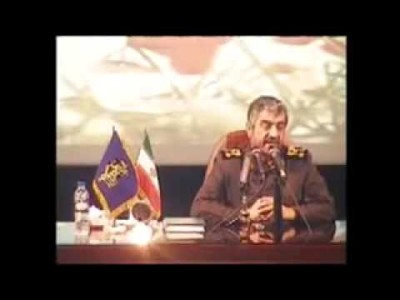A leaked video, appearing to feature candid remarks by Islamic Revolutionary Guards Corps commander Mohammad Ali Jafari (pictured), has revived claims that the IRGC interfered in the 2009 Presidential election to block a victory by the challenger Mir Hossein Mousavi.
The Iranian regime has always maintained, despite extensive evidence to the contrary, that President Ahmadinejad was re-elected with 62% of the vote. Security forces detained many activists and political workers before and after the ballot, and it reacted to mass protests with more detentions, disruption of communications, and repression of opposition activities.
In the video, posted on the Facebook account of dissident filmmaker Mohammad Nourizad, Jafari appears to be discussing the IRGC’s operations with its senior leadership. The clip is not dated.
Jafari is forthright about the IRGC’s fears of the election of a reformist candidate and the revival of the policies of the Mohammad Khatami Government of 1997-2005:
The worry and concern which existed and the red line that existed for the forces of the Revolution was that the forces that were against the Revolution and its values, which during the period of the Second of Khordad (the Khatami era) had found an opportunity and had penetrated the regime, would once again come to power.
The commander does not explicitly admit Guards’ intervention, but he speaks at length about the claims — not just by the protesters and the Green Movement, but also by members of the Iranian establishment — that the IRGC had done so:
In the election and the events afterward, it became clear why they (reformists) insisted so much that the IRGC and Basij (militia), under the label “military forces”, should not interfere with the election so that they could carry out their plot and the IRGC and Basij do not bother them….
Many officials, many elites, and even some clergymen are unclear in relation to the events that happened, and some still have objections.
Jafari’s statement complements other evidence — from the IRGC itself — that the Guards used detention, repression, and disruption of communications to stop Mousavi. In summer 2010, a leaked audio and Power Point documented a presentation by a “General Moshfegh” outlining the IRGC’s strategy before and after the ballot.
See Proof of Revolutionary Guard Interference in the 2009 Election?
A few days before the vote, the head of the IRGC’s Political Directorate, Brig. Gen. Yadollah Javani, accused Mousavi and other reformists — who had adopted Green as their symbol of trying to start a “color revolution”. He warned that the Guards “will suffocate (the movement) before it is even born.”
In his presentation, Jafari justifies the crackdown on the Green Movement by citing the Supreme Leader’s Tehran Friday Prayer of June 19, 2009, warning that protests would not longer be tolerated: “If they do not cease, then the responsibility of the consequences, the chaos, will be with them.”
Jafari asserts:
After that it was natural that we must not allow even what they themselves call ‘quiet demonstrations’ take place.
It was predicted that when this approach was taken there would be one or two more days of demonstrations; however, fortunately with this approach from Saturday afternoon (protests of June 20, in which security forces killed dozens of demonstrators, including Neda Agha Soltan) and after this ban came into place nothing happened any more….
Two very fundamental and strategic actions had an impact in clearing up this affair. One was the very widespread arrests which was carried out by the security forces, and partially the IRGC, at the level of planners and ideologues of this affair.
And then the confrontations, which in a widespread manner, with the presence of the Basij popular forces and the IRGC, and with the assistance of the police and security organizations, took place for confronting this affair, including the most important one which took place on Saturday afternoon….
These two fundamental actions plus the cutting of their communications, meaning creating disorder in their communication systems, including internet networks, mobile networks, SMS, etc. had a big impact on messing up their plans.
(Hat tip to Iran Politik for translations)

